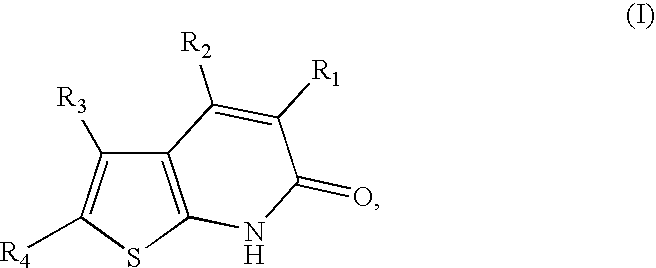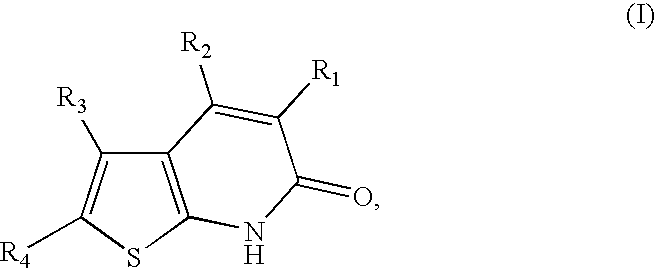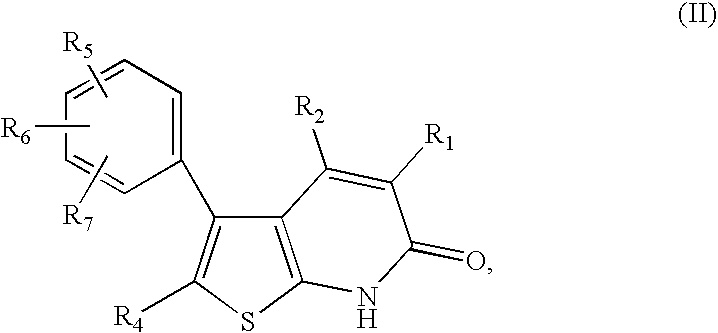Thienopyridones as AMPK activators for the treatment of diabetes and obesity
a technology of ampk activator and thienopyridone, which is applied in the field of compounds to achieve the effect of reducing body weigh
- Summary
- Abstract
- Description
- Claims
- Application Information
AI Technical Summary
Benefits of technology
Problems solved by technology
Method used
Image
Examples
example 2a
2-Amino-4-(3,5-dimethyl-phenyl)-thiophene-3-carboxylic acid ethyl ester
To an ambient solution of 3,5-dimethylacetophenone (1 g, 6.75 mmol) in ethanol (20 mL) was added ethyl cyanoacetate (1.53 mL, 13.5 mmol, neat) dropwise via syringe over 5 minutes. The resultant clear solution was heated at 60° C. for 20 minutes. The solution was then allowed to cool to room temperature and morpholine (2.15 mL) was added in a single portion. The resultant light green solution was heated at 60° C. for an additional 5 minutes and then cooled to room temperature. Elemental sulfur (0.43 g, 13.5 mmol) was then added to the reaction mixture in a single portion and the yellow suspension was heated at 60° C. for 48 hours. The reaction mixture was then cooled to room temperature and ethanol removed under vacuum. The residue was dissolved in CH2Cl2 and purified on a flash column to provide the title compound. MS (ESI) m / e 274.0 (M−H)+; 1H NMR (300 MHz, CDCl3): δ ppm 7.26 (s, 1H), 6.92 (s, 2H), 6.04 (s, 1H...
example 2b
2-(2-cyano-acetylamino)-4-(3,5-dimethyl-phenyl)-thiophene-3-carboxylic acid ethyl ester
To a stirred suspension of PCl5 (0.74 g, 3.5 mmol) in CH2Cl2 (10 mL) was added a solution of cyanoacetic acid (0.3 g, 3.5 mmol) in CH2Cl2 (5 mL) and DMF (1 mL) dropwise via syringe at room temperature and the reaction mixture was heated at reflux for 1 hour. The reaction was cooled to room temperature and a solution of 2-Amino-4-(3,5-dimethyl-phenyl)-thiophene-3-carboxylic acid ethyl ester (0.78 g, 2.8 mmol) in CH2Cl2 (5 mL) was added via canula over 5 minutes. The reaction was then heated at reflux for 2.5 h, cooled to 0° C. and quenched by slow addition of sat. aq. Na2CO3 (10 mL) until basic (pH 9-10). The mixture was extracted with ethyl acetate (3×30 mL) and the combined organic layers were washed with water (25 mL), brine (15 mL), dried (Na2SO4), filtered and concentrated under reduced pressure to provide the title compound as a yellow solid. MS (ESI) m / e 341.0 (M−H); 1H NMR (300 MHz, CDCl3...
example 2
3-(3,5-dimethylphenyl)-4-hydroxy-6-oxo-6,7-dihydrothieno[2,3-b]pyridine-5-carbonitrile
To a suspension of either NaH (60% suspension in mineral oil, pre washed with hexanes, 0.25 g, 6.2 mmol) held at room temperature or Lithium diisopropylamide (LDA, 2M solution in THF, 11.3 mmol, 5.6 mL) held at −78° C. in THF (30 mL) was added a solution of 2-(2-cyano-acetylamino)-4-(3,5-dimethyl-phenyl)-thiophene-3-carboxylic acid ethyl ester (0.968 g, 2.83 mmol) in THF (15 mL) dropwise via syringe over 10 minutes. The mixture was stirred at room temperature for 5 hours (or in the case of LDA, allowed to warm to room temperature over 16 hours), cooled to 0° C. and then quenched by dropwise addition of MeOH (5 mL) followed by 1N HCl to adjust the pH <3. The resultant slurry was filtered and the solid was washed with water (4×4 mL), ether (3×4 mL) and (Na2SO4), filtered and concentrated under reduced pressure to provide the target compound. The filtrate was concentrated and purified on a RP-H...
PUM
| Property | Measurement | Unit |
|---|---|---|
| cellular energy homeostasis | aaaaa | aaaaa |
| cellular energy | aaaaa | aaaaa |
| energy | aaaaa | aaaaa |
Abstract
Description
Claims
Application Information
 Login to View More
Login to View More - R&D
- Intellectual Property
- Life Sciences
- Materials
- Tech Scout
- Unparalleled Data Quality
- Higher Quality Content
- 60% Fewer Hallucinations
Browse by: Latest US Patents, China's latest patents, Technical Efficacy Thesaurus, Application Domain, Technology Topic, Popular Technical Reports.
© 2025 PatSnap. All rights reserved.Legal|Privacy policy|Modern Slavery Act Transparency Statement|Sitemap|About US| Contact US: help@patsnap.com



